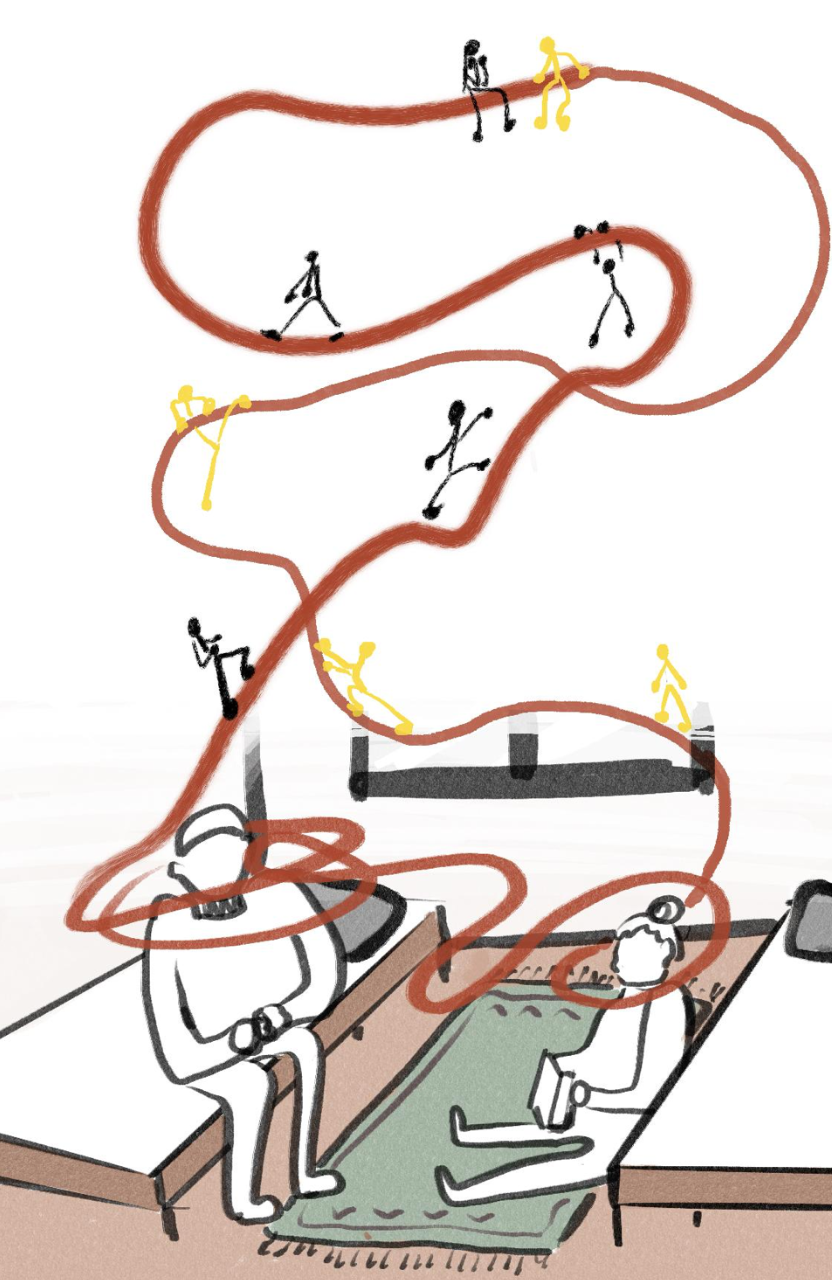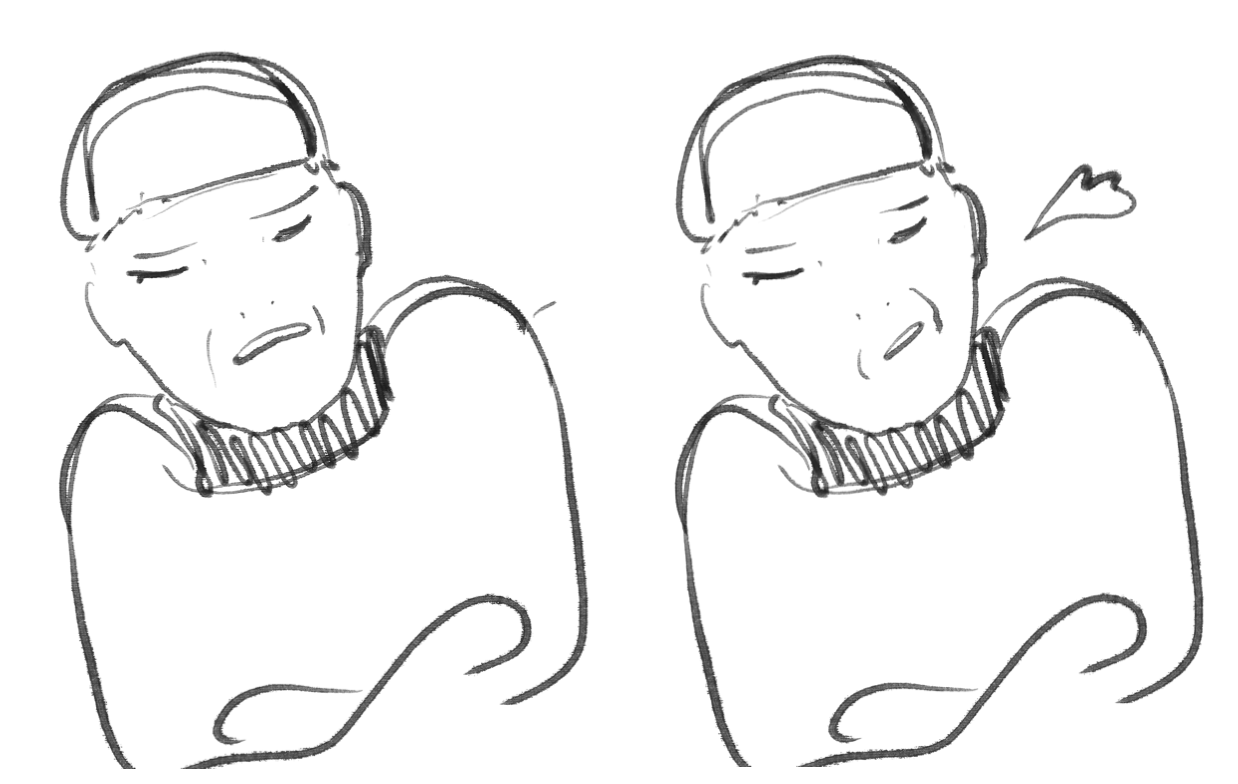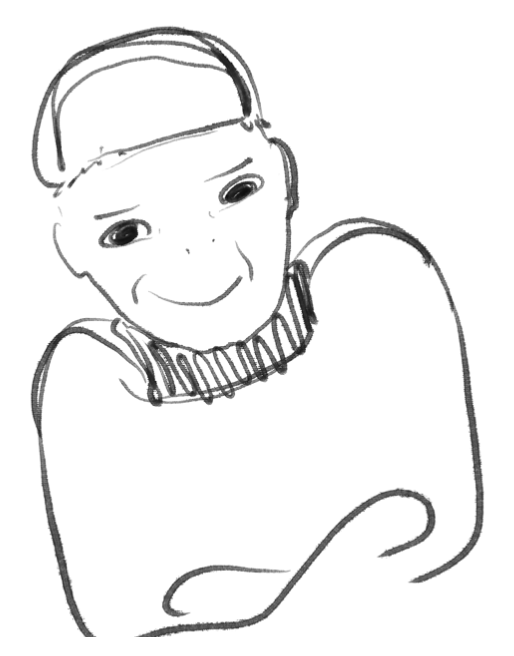Instructions to read the interview:
➔ Bolded parts highlight when gramps would switch from the professional intonation, which he used when talking about context he had done previous research or wrote it down, to the more personal and free-style one.
➔ Pause when you see a picture. The illustrations added are meant to create the same effect as when gramps took very long pauses between sentences.
➔ Try to read the storyboard and the animatic better understand my perspectives and the potential biases I might have that I have not been able to recognize in the analysis.
➔ Shiptar -> An Albanian in the Albanian language that encompasses a more extensive group out of borders. All people that speak Albanian.
➔ Kosovar -> an Albanian form Kosova.
➔ Albanian -> an Albanian from Albania.
Oral Interview
I, Rifat Ademi, was born Apri 29 1948, in Pestova village, resident of Republic of
Kosova. I need to tell events that I've been through from the suspension of the
parliament and the autonomous province of Kosova from Serbia, led by the butcher of
the Balkans Slobodan Milosevic 1989 -1990.

It started with the change in classes' curricula, Shqip, history, art, and music. We, the teachers, opposed the change of curricula. After we did not accept this, dismissals started because not accepting the curricula meant not accepting Serbia. There were 180 professors in the school I worked at, 90 Shqiptars, 90 Serbians, and Montenegrins. They stopped our wages as a first step. Wages were gotten in school through the paymaster. 80 wages were given to the Serbs, the next day, our wages were also given to the Serbs but under the pretense of the assocciation of Serbo-Slavs (Sveti Slava). For three years they took our wages until they got suspended officially. We had to work in the fields for food. We would get monetary help from Albanians from western countries.

Then they started violence against students by poisoning them. We were really careful and vigilant. Serbo-Croat teachers had the poison in their bags and they threw it in classes so it was hard to catch them. Interestingly, when you would go inside classrooms, the smell was similar to peeled oranges and you could not get enough of the smell. You could not fill your starvation of smelling enough of it. We, the older ones, were not affected. The young ones would faint and they would freeze in place, could not move. We called the ambulance and the Serbian police would come with armored cars. They would say we were stimulating the situations and it was all an act. So we would use our personal cars to send some students to the hospital. The students would keep falling on the ground. Mostly females would get attacked from it. They would not poison all the classes. It would be random. One time, I had only two classes that day. After I finished them, the 8th graders got poisoned. My colleague had to teach that class that day. But he sent the students to the hospital with his car. So the students that were left, I sent them home. Because not everyone would get poisoned. When I send them through the main door, a janitor, female, was put by the school director to spy on what was happening. She saw us and went to tell the director. The director called me and told me I took the students out. I told him to look at the calendar for classes. I told him I was done for the classes for that day, and at the time those students were left out I was already long done with my work. I told him he should not accuse me with the words of the janitor. So he yelled at her because he thought she had lied to him. But she did not, It was me who was lying.
In a meeting of workers, 1991, the member of the commission of the central committee of Serbia, Mihajlo Mihajlovic, held a meeting with all workers for three hours. The school director led the meeting, Mihajlo told the director that when he is done talking to not let the shqiptars talk. To not let them ask questions. A fellow teacher, Daut Bogojevci, addressed Mihajlo with the word “mister”. In socialism, the word “comrade” was a respectful way of addressing someone. That word “mister” was rude. Mihajlo said that with the change of Kosova’s curricula and constitution, you shqiptars do not lose anything and Serbs do not gain anything. Dauti told him that If we don’t lose anything and they don’t gain anything, then why change it in the first place? Just leave it as it is. We got up and started clapping. They were annoyed. They told us to get out. Since then they never let us enter the school building again. We started to go to the schoolyard to protest with other teachers and parents. Our parula would be in English and Shqip. Shqiptar students inside would show two fingers in the windows. Serbian students would show three fingers, which stood for “Stamo Spasi Serbia” (“only our union saves Serbia”). The three S’s in their flag. Two fingers meant democracy, freedom. Teachers and parents decided to open private house schools. Parents would give us their houses, we made Kosovar curricula and would teach students in houses. Even then the Serbian police would burst in and harass us. We did not have desks or chairs, we sat on the ground. The conditions were cruel. Our people were exhausted. I worked even though I did not get paid for five years because I was doing it for my nation and for God.

We continued teaching in house schools from
1991 until two days before the NATO’s bombs weremthrown (22.03.99). When the bombs started, 78 days we did not go to school. We left
our houses and stayed in the war zone up in the mountains. When we returned to the
village, our house was burned. We returned 26.7.99 in official school departments.
︎
Reflection
“Two of my saddest life memories are when they banned me from the school and when they expelled me from my house. Two of my happiest memories were when I returned to teach in the school, and I went inside my house again.”
That is how my grandpa started our conversation. The word limit of the assignment made me choose to write either about the school or the house. Since he started talking about the school story first, I took it as a sign that it is more important to him. The house story was emotionally charged, both for him and me, which made it hard to work on our personal emotional biases and try to recognize the interpretive lenses that would come with it. The house story included it being burned in the war, the killings they saw, the torture, and unresolved conflicts. Grandpa has PTSD. He has never left our house empty since he returned to it after it was burned. The story of his time as a teacher was easier for him. I let him choose the place he felt most comfortable to do the interview. He chose his bedroom. I tried to translate the story the way he talked; that’s why the narration is in his voice. I changed the order of the narration to make the events linear in time. Gramps explained the events in circles; he would go back and forth. I understood what event he was referring to because of my past context, but writing it that way would not be understood by the broad audience. If I continued to write in circular narration, just as he told it, I would have to add some of the contexts in my own words. I hesitated to do that since I don’t trust myself enough not to add my voice to it. I rearranged the events in a linear timeline; that way, I did not have to add anything of my own.
Gerontologist Robert Butler explained how older people, knowing they’re approaching death because of old age, undergo a mental process of reviewing life whether someone asks about their memories or not, revealing details unknown to their family before. Butler concluded that memory “serves the sense of self and continuity” (Ritchie, 2015). I left gramps to show his narration since that is the identity he built through language. Sociologist Daniel Schudson argues that memory can only be expressed through the 'cultural construction of language in socially structured patterns of recall,' thus in the most critical sense all memory is collective cultural memory (Green, 2004). But gramps spoke both in Serbian and
Albanian at the time, creating a bridge between the two cultural perceptions of recall. The iteration of th school curricula threatened the Identity created by the shared Albanian language and culture. understood how important the education system is in creating a national identity and how one’s professio (being a teacher) is essential to creating personal Identity. By using words such as “the butcher of the Balkans” and “Serbo-slav,” “Serbo-Montenegrins,”” Serbo-Croat,” I understood that my grandpa i affected by the shared Balkan identity. Since at the time, they did not have an official country to identify with, they identified through the Balkan narrative by needing to develop a sense of their collective past. Now that we have an independent nation, my grandpa identifies with other teachers and their collective narrative. This is apparent by the repetitive usage of “we” and “us” when explaining his personal story. The only instances when grandpa’s identity, detached from the historical Balkan identity and the shared narrative of the community of teachers, would come out is when he used his wit to get out of trouble (when he lies that he did not let the students out after the poisoning in schools). The Balkan collective memory refers to the fluid way the groups of people affected by Serbia created, and identified with specific narratives about historical periods or events (The Bosnian genocide, how a Serbian nationalist started WWI). This led to Serbia being called the “troublemaker of the Balkans” and its leaders “butchers of the Balkans.” Historical memory involves a collection of familial, religious, and national memories. We are a Muslim country, which surprisingly was not seen as part of the memory in the personal story told in the interview. God is mentioned only once. This shows our people’s priority for the national memory over religious ones since we had a bigger threat in common than religious differences within Kosova. Pashko Vasa's poem “O moj Shqypni” has a stanza, "the faith of the Albanians is Albanianism," which even became a state policy in the communist regime of Enver Hoxha.
My grand-grandfather and my grandfather were soldiers in Yugoslavia. My father was a soldier in the Kosovan war. I am the first generation in m family that is not living in wartime and have not been a soldier (yet). Although, I identify with war through the intergenerational memory of the war narratives fro my family members (animatic) and the meaning of my name (storyboard). I‘ve heard this story many time before. So I knew details he forgot to say. I also know my family's issues because my grandpa continued to teach in schools even though he was not getting paid. My father, as a kid, had to skip school sometimes to help around the field. My grandma was sad her husband was not home when needed and would come back beaten by the Serbian police. As much as his story as a teacher is inspiring to others, it has a bitter taste for our family. But I also realize that transparency is needed to get to historical truth. Even though this was an experience that hurt our family short term, it is still something that helped the country in the long term, which also helped our family. My grandpa had expectations since he knew this would be an interview from school. So he prepared things he, as a teacher, thought would be necessary. But he was not a history teacher. He felt that already established historical context was what I needed. So I had to guide him through the historical context of his personal experience.
I translated the word “Shqiptar” to Kosovar in some instances. ”Shqiptar” is the Albanian word for “Albanians,” and “Shqip” is the Albanian word for “Albanian.” “Shqiptar” means the children of the eagles, and that is how we call ourselves. “Albanian” means “people that live on the mountains,” and it’s a name other nations called us. I realized I did so because I, and my generation, do not identify with the great Shqiperi (Albania), where Kosovars and Albanians were one country. I identify as a shqiptar from Kosova, a Kosovar. Thus I used my identity lens to translate the story. It was only after thinking of the history and identity as a concept that I realized that fact.
︎
References
Ritchie, D. (2015). Excerpts from Ch. 1: An oral history of our time. In Doing oral history:
A practical guide (3rd ed., pp. 1-14). Oxford: Oxford University Press. Green, A. (2004). Individual remembering and 'collective memory': Theoretical presuppositions and contemporary debates. Oral History, 32(2), 35-44.